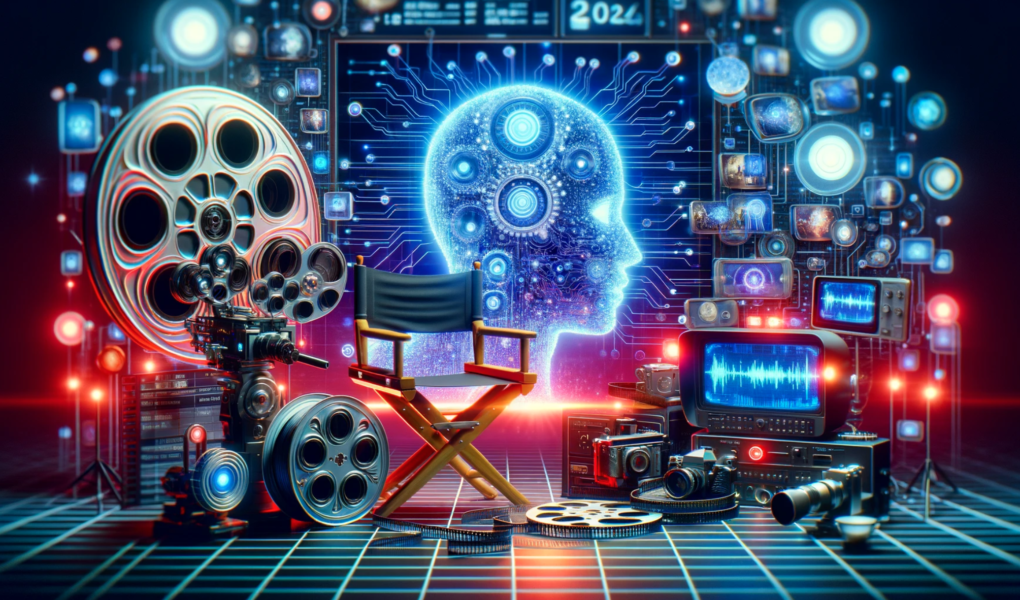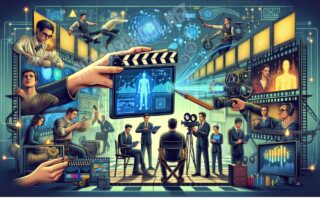Technology has been a driving force behind some of the most groundbreaking advancements in the film industry.
In 2024, one of the most profound technological revolutions taking place is the integration of Artificial Intelligence (AI) in the film-making industry.
This fusion of creativity and cutting-edge technology is reshaping the way films are created, from pre-production to post-production, and even in distribution and marketing.
In this blog post, we will delve deep into how AI is revolutionizing the film-making industry in 2024, and how it is influencing the art and business of cinema.
AI and Pre-Production: The Creative Spark
Scriptwriting and Storytelling
The creative process of filmmaking begins with a story, and AI is playing a significant role in shaping the narratives we see on screen. AI-powered tools can analyze vast amounts of data, including successful film scripts, to help screenwriters develop compelling and marketable stories.
These tools can offer suggestions for plot twists, character development, and even dialogue based on the genre and target audience.
AI can also assist in generating entirely new scripts. OpenAI’s GPT-3, for instance, has demonstrated remarkable capabilities in generating coherent and engaging stories. Writers can use these AI-generated scripts as a starting point and add their creative touch to bring them to life.
Casting and Character Creation
Selecting the right actors for a film can make or break its success. AI is making this process more efficient by analyzing an actor’s past performances, social media presence, and even facial expressions to gauge their suitability for a particular role.
In addition, AI can help in creating entirely digital characters, like deepfake technology for realistic facial expressions, which is becoming increasingly popular in the industry.
Location Scouting
AI can also aid in the challenging task of location scouting. By analyzing a database of potential shooting locations and considering factors like weather, lighting, and historical data, AI can recommend ideal locations for specific scenes. This not only saves time and money but also enhances the visual appeal of the film.
AI and Production: Enhancing Efficiency
Camera Technology
In 2024, AI-driven cameras have become an integral part of film production. These cameras can automatically adjust settings like focus, exposure, and framing in real-time, ensuring that every shot is of the highest quality. They can even predict movements and adjust accordingly, making it easier for cinematographers to capture complex sequences.
Visual Effects
The use of AI in visual effects (VFX) has been steadily growing over the years. AI algorithms can generate lifelike simulations, such as fire, water, and smoke, with incredible realism. This reduces the need for expensive practical effects and post-production work, making VFX more cost-effective and efficient.
Moreover, AI can assist in enhancing and automating the process of rotoscoping, a crucial technique in VFX that involves isolating elements in a scene for compositing. This streamlines the production timeline and reduces the workload for VFX artists.
Editing and Post-Production
Editing is a labor-intensive part of filmmaking, but AI is simplifying the process. AI-powered editing software can analyze hours of footage, identify key moments, and even suggest the best shots to use. It can also automatically sync audio and video, saving countless hours in the editing room.
AI and Distribution: Personalized Content
Content Recommendation
In the era of streaming platforms, personalization is key to retaining and attracting viewers. AI algorithms analyze user behavior, preferences, and viewing history to recommend content tailored to individual tastes. This keeps audiences engaged and helps platforms like Netflix and Amazon Prime stay competitive.
Dynamic Pricing
AI is also influencing the pricing strategies of content providers. It can analyze market trends, demand, and even real-time data to adjust pricing dynamically. For instance, ticket prices for a movie screening can vary depending on factors like demand, time of day, and even weather conditions.
AI and Marketing: Targeted Campaigns
Audience Insights
Understanding the target audience is essential for successful marketing campaigns. AI can analyze social media data, surveys, and online behaviour to provide valuable insights into audience preferences. This helps marketers tailor their strategies and create content that resonates with viewers.
Content Creation for Promotion
AI-powered tools can generate promotional content such as trailers, posters, and social media teasers. These tools can analyze the film’s content and audience preferences to create compelling and attention-grabbing materials.
Challenges and Ethical Considerations
While AI has brought about significant advancements in the film industry, it also raises several challenges and ethical considerations:
Loss of Creative Control
Some argue that AI may lead to a loss of creative control in filmmaking. As AI algorithms make more decisions, filmmakers may have less influence over the final product. Striking a balance between AI’s efficiency and human creativity is a critical challenge.
Ethical Use of Deepfakes
Deepfake technology, while powerful, also raises concerns about misuse. The ability to manipulate and impersonate individuals convincingly can have serious ethical and legal implications. The industry must develop guidelines and regulations to address these issues.
Data Privacy and Security
AI relies heavily on data, and the film industry collects vast amounts of personal information from viewers. Ensuring the privacy and security of this data is essential to maintain trust with the audience.
Conclusion: The Future of AI in Film
As we step further into 2024, AI continues to revolutionize the film-making industry in ways we couldn’t have imagined a decade ago. From scriptwriting to distribution and marketing, AI is enhancing efficiency, reducing costs, and expanding creative possibilities.
However, it also comes with challenges and ethical considerations that must be carefully addressed.
The future of AI in film promises exciting opportunities for filmmakers, actors, and audiences alike. As AI technologies evolve, we can expect to see even more groundbreaking innovations in the years to come. It’s an exciting time for the film industry, where creativity and technology converge to create unforgettable cinematic experiences.
So, keep an eye on the silver screen – the next blockbuster might just owe its success to the magic of AI.


